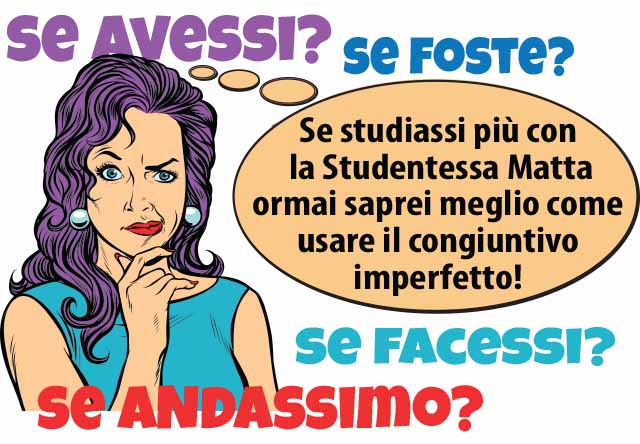
Congiuntivo Imperfetto — Non è un argomento di cui ridere…
(o forse dovrebbe essere! LO)
The Imperfect Subjunctive — It’s No Laughing Matter… or Maybe It Should Be! LOL
Mantenere il senso dell’umorismo: Essenziale nello studio dell’italiano
Keeping Your Sense of Humor: Essential in Learning Italian
Mantenere il senso dell’umorismo è fondamentale quando ci si addentra nello studio dell’italiano, tra preposizioni, pronomi diretti e indiretti, e tempi complessi come l’imperfetto e il trapassato del congiuntivo. Ridere dei propri errori, infatti, stimola il rilascio di endorfine, riducendo lo stress e l’ansia, rendendo l’apprendimento di una nuova lingua più piacevole e gratificante.
Keeping your sense of humor is essential as you delve into the study of Italian, navigating prepositions, direct and indirect pronouns, and complex tenses like the imperfect and past perfect subjunctive. Laughing at your mistakes triggers the release of endorphins, reducing stress and anxiety, making learning a new language more enjoyable and rewarding.

Cominciamo! Parliamo dell’Imperfetto Congiuntivo.
Let’s Get Started! Let’s Talk About the Imperfect Subjunctive.
L’imperfetto congiuntivo in italiano (come in altre lingue) si utilizza per esprimere dubbi, incertezze o situazioni ipotetiche riferite al passato. Viene impiegato per parlare di idee o scenari contrari alla realtà e trova spazio sia nella lingua parlata che in quella scritta.
The imperfect subjunctive in Italian (as in other languages) is used to express doubts, uncertainties, or hypothetical situations in the past. It is employed to talk about ideas or scenarios that are contrary to reality and appears in both spoken and written language.
Uso Condizionale e Discorsi Indiretti
Conditional Usage and Reported Speech
È spesso usato nelle proposizioni condizionali introdotte da “se” per indicare una condizione non realizzatasi o poco probabile nel passato.
It is often used in conditional clauses introduced by “if” to indicate a condition that did not occur or is unlikely to have happened in the past.
Se avessi più soldi, viaggerei di più in Italia.
I thought aliens were in another galaxy, but they just arrived on Earth!
Un altro impiego si trova nel discorso indiretto, dove può esprimere dubbi sulla veridicità di una dichiarazione.
Another use is in reported speech, where it can express doubts about the truth of a statement.
Marco ha detto che avesse visto un alieno!
Marco said that he had seen an alien.

Formazione dell’Imperfetto Congiuntivo
How to Form the Imperfect Subjunctive
To form the imperfect subjunctive of most verbs
drop the —re from the infinitive and add the endings
—ssi, —ssi, —sse, —ssimo, —este, —essero.
The following chart shows the imperfect subjunctive of
regular -are, -ere, and –ire verbs.
—are verbs
Studiare
Che io
Che tu
Che lui/lei
Che noi
Che voi
Che loro
Studiassi
Studiassi
Studiasse
Studiassimo
Studiaste
Studiassero
—ere verbs
Prendere
Prendessi
Prendessi
Prendesse
Prendessimo
Prendeste
Prendessero
—ire verbs
Capire
Capissi
Capissi
Capisse
Capissimo
Capiste
Capissero

Pensavo CHE gli alieni fossero in un’altra galassia,
invece sono appena arrivati sulla Terra!
I thought aliens were in another galaxy, but they just arrived on Earth!
Io non sapevo CHE gli alieni avessero così tanta fame.
Io non sapevo CHE gli alieni avessero così tanta fame.
Vorrei CHE ci fosse più tempo per scappare.
I wish there was more time to escape.
Il tempo imperfetto del congiuntivo italiano può
essere difficile da imparare per diverse ragioni.
The Italian Subjunctive Imperfect tense can be difficult to learn for several reasons.
Complex conjugation: The subjunctive imperfect tense has several irregular verb conjugations that can be difficult to memorize. In addition, the verbs often have endings similar to other verb tenses, making them confusing to remember.
Nuanced usage: The subjunctive imperfect tense is used to express hypothetical or uncertain situations, which can be more nuanced than other verb tenses. To use this tense correctly, students need to understand the language and the context in which the tense is used.
Lack of exposure: Many learners of Italian may not have much exposure to the subjunctive imperfect tense in their native language, making it more challenging to understand and use.
Regional variation: The subjunctive imperfect tense is used differently in different regions of Italy and even among different generations and social groups.










